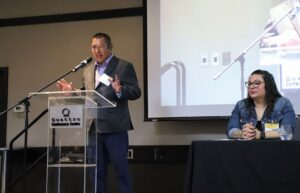Mental Health, Addiction and Opioid Summary Report now available

By Jesse Johnson
ANISHINABEK NATION HEAD OFFICE – The Anishinabek Nation’s Health Secretariat has been busy tackling mental health, opioid, and addiction since hiring two new staff members in October 2022.
Upon joining the Health Secretariat, Tim Ominika, Mental Health and Addiction Systems Specialist, and Katie Pine, Opioid Strategic Planning Specialist, hit the ground running by hosting roundtable discussions in five regions over the course of two months with the goal of better understanding the mental health and addiction issues affecting our people.
In May 2022, leadership passed the Anishinabek Nation Long-Term Healing Strategy to direct the Anishinabek Nation to create and implement a long-term health strategy that is guided by Anishinabek values and principles and led through engagement and direction from our member communities.
The Anishinabek Nation was also directed to seek funding for this initiative from the provincial government; increase awareness around overdoses and legislation, which encourages and protects those who seek assistance; lead and coordinate the creation of a Long-Term Advisory Group; and, report back to the Anishinabek Special Chiefs Assembly on progress and initiatives.
With 39 First Nations invited to the discussion, participation was relatively low for frontline workers in a number of communities.
“We need more participation and representation so that we have a better idea of what exactly needs to be done,” says Jamie Restoule, Anishinabek Nation Health Director. “We would have liked to see more than 18 communities participate in the roundtable discussions. That being said, the conversations were incredibly insightful.
In the Southeast Region, five out of the eight communities had representation present and engaged in the discussion and the Southwest Region, frontline worker representation from three of the communities was absent; however, the Chippewas of the Thames had the largest number of attendees present.
The Lake Huron Region saw eight of the 18 communities represented and engaged in discussions, while the Northern Superior Region had four of the nine communities present and active in the discussions.
“We got an inside look to what each community is lacking, what they’ve done so far, what they’re working on, and what is needed to improve their programs and services to facilitate growth and healing,” says Pine.
Communities have been working hard to improve their programs and services.
“Of the communities we spoke to, most of them have implemented harm reduction strategies such as clean kits and meeting people where they’re at in their journey. These services would impact individuals struggling with their mental health and addiction in a positive way,” she continued. “What is lacking is community participation. It was mentioned time and time again through these discussions that workers aren’t seeing community members accessing these services for a number of reasons, such as, confidentiality and stigma.”
“When talking about lack of confidentiality, it’s clear that it’s not due to worker indiscretion, but due to community stigma and judgment when someone seeks out services,” adds Ominika.
Roundtable discussions led to an important conversation about worker burnout, staff working in their home communities while also dealing with mental health and addictions within their own families. A lot of the talking points were about grief for workers and community members.
“Our communities have suffered great loss over the last 10 or so years due to mental health, addiction, and opioids, grief, and trauma healing was strongly recommended as a way to move forward. Our workers need support and days to solely focus on self-care to reach and maintain their full potential,” says Pine.
Another important topic was funding and budget allocations.
The report goes on to say that an increase in the amount of funding would give the Anishinabek Nation First Nations the ability to create permanent full-time positions and hire more staff.
“Current contract positions don’t allow for tenure, necessary paid vacation and/or sick time, and do not allow for fair wages. This has an impact on worker turnover, which is typically high in our communities. Reducing the rigidity of eligible expenses will allow frontline workers the ability to assist community members in a more holistic, cultural approach”
The final topic of discussion for the report was police involvement, lack of treatment options for those willing and wanting treatment, and a lack of support of services for families.
The report says police services were invited to the discussions; however, only saw one representative from one community. There are plans to continue discussions with police services throughout the territory.
“Treatment services for individuals who want to make changes have been the most difficult for communities. Individuals that are seeking out treatment are ready to go on the spot; however, there aren’t any beds available in that moment and typically result in a waitlist. When a bed does become available, the individual has unfortunately turned back to their addiction and will change their mind about attending treatment.
“Often times, what we see is an individual receiving services and the family is left to deal with the consequences on their own because those services just aren’t available.”
To participate or stay up-to-date on any upcoming sessions regarding mental health, opioids, and addictions, please e-mail Katie Pine: katie.pine@anishinabek.ca or Tim Ominika: tim.ominika@anishinabek.ca


